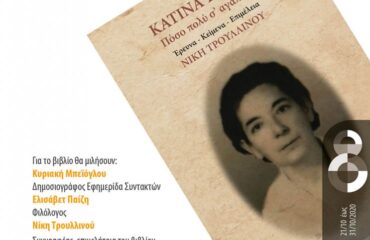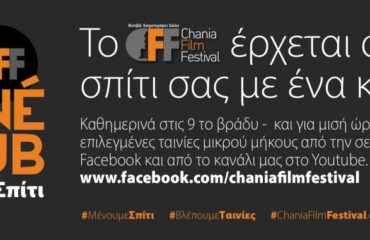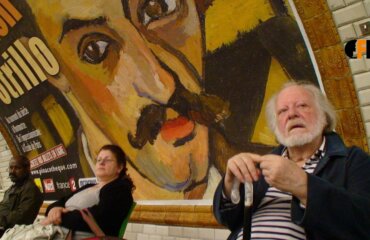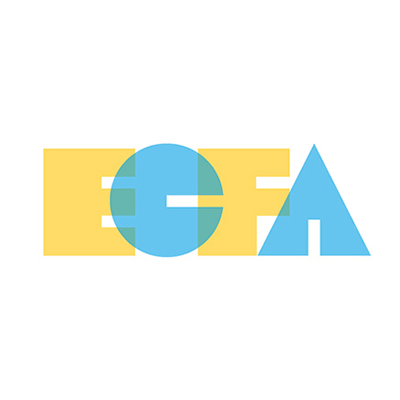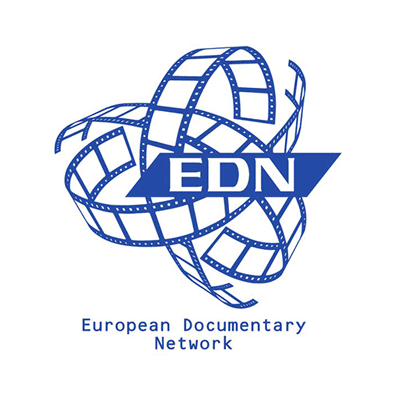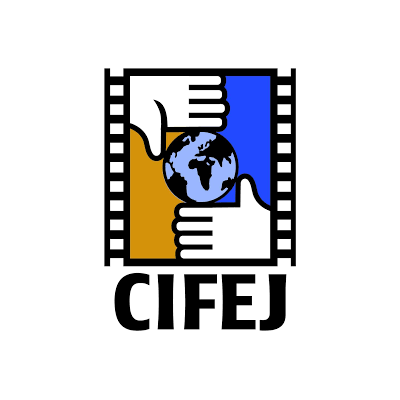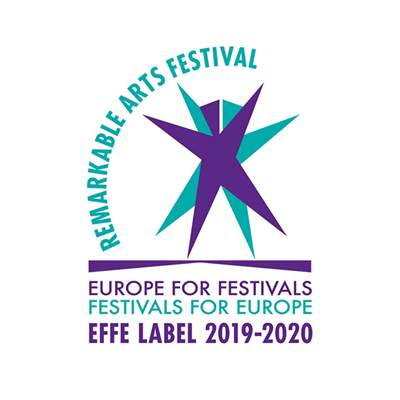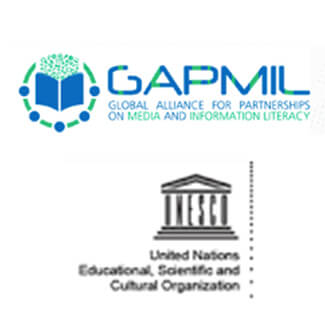The detailed program of the 7th Chania Film Festival was announced today, which will take place from 23 October to 2 November at the Cultural Center of Chania.
The program of the films as well as the parallel actions was posted on the festival’s website at
where you can also find the festival’s catalogue in electronic form.
See also the official trailer of CFF7 with the signature of Thodoris Papadoulakis and the creative team of Indigo View
More than 150 films covering a wide range of content focusing on the art of cinema, make up this year’s program. Fiction and documentaries, short and feature films and animation are part of it.
Exhibitions, masteclasses, publications, parties.
Special screenings, tributes and a rich list of films and workshops for schools, within the framework of the festival’s educational activities.
Dozens of guests will join us to share their work, experiences and thoughts.
For 11 days the heart of Crete will be beating cinematically in Chania!
Those who are at the 7th Chania International Film Festival, among others, will live unique experiences with:
Premiere
The 7th Chania Film Festival premieres on Wednesday, October 23, 2019, screening the emblematic film Stella by Michael Cacoyannis in a new digital edition for the needs of the Festival.
The film Stella represented Greece at the Cannes Film Festival in May 1955, receiving favorable reviews, while in 1956 he won the Golden Globe, the Best Film Award of Hollywood foreign press correspondents, paving the way for director Michael Cacoyannis for great films and distinctions and her protagonist, Melina Mercouri for an international career. In 1960, he received the Best Film Award of the period 1955 – 1960, at the first Thessaloniki International Film Festival. “In a world where women are tormented, both in their family and social environment, questionable and submissive, the film comes to show the way of her emancipation, projecting Stella, the woman who rebels against all sorts of conventionality, taking fate into her own hands. The way the director stands against Stella, combined with the praises of the foreign press, highlighted the heroine as the model of female liberation”.
Fiction films that captivate like…
Her work, by Nikos Labôt. It follows the life of Panagiota, an almost illiterate housewife and mother of two children who shortly before the age of 40 is forced to work for the first time as a cleaning lady in a new department store when her husband loses his job.
Meltem, by Vasilis Doganis. Three friends from France are coming to Lesvos at a time when the refugee crisis has already begun. His carefree vacation will be interrupted when they meet a Syrian refugee whom they will help.
Coup d’état, by Mahmoud Fazil Koskun. Inspired by real events, she tells the story of a single night. It is a scathing depiction of Turkey’s uncertain political past and present.
When Wagner met the tomatoes, by Marianna Economou. While in the plain of Thessaly, agriculture is slowly dying, a small village resists. There, two young farmers and five women start growing old tomato seeds, slowly enter the world market and keep their village alive. (the film will represent Greece this year in the process of claiming the Academy Awards for International Feature Film).
Crete Arising, by Konstantinos Papanikolaou. Every year, Crete ranks among the best holiday destinations in the world. Worried that the big industry of tourism is changing the Cretan culture, a group of climbers begins to organize the first mountaineering ski race on the island.
FOR NO REASON meetings with Giorgos Maniatis, by Stavros Psyllakis. Giorgos Maniatis (1939-2018), legionnaire in Algeria at the age of 18, writer and musician afterwards, defines himself as a “public danger”. The film seeks the adventure of his soul, a consciousness in constant alertness.
Supa Modo, by Likarian Wainaina. Nine-year-old Joe, who loves action movies, is seriously ill and has a few more months to live. Her mother tries to protect her in every way, but her sister urges her to believe in her magical abilities and convinces the village to help her realize her dream.
An Elephant Stands Motionless, by Hu Bo. Beneath the grey sky of a sad northern Chinese city four people embark on a 24-hour period that will ask them to reposition themselves in the face of their stagnant daily lives. (The debut and at the same time swan song of Hu Bo who after the completion of the film committed suicide).
British Made, by Simon Rickard. After his release from prison, a member of a forbidden nationalist gang begins to reveal the truth behind his troubled past, leading to violent consequences.
Riders of Destiny, by Michael Nierman. On an isolated island in Indonesia, two children aged five and seven train exhaustively every day, under adverse conditions, with the aim of triumphing in the national horse race races.
Holy Boom, by Maria Lafi. Mapping the multiculturalism of Athens through the hidden world next door.
Jim Button, by Dennis Gansell. A trip to the City of Dragons for the release of the princess.
And the shorts…
Patission Avenue, by Thanasis Neofotistos. Walking on Patission Avenue, one of the most contradictory areas of the center of Athens, the protagonist will struggle to balance all the roles of her life through her cell phone.
37 days, by Nikoleta Leousi. When Maria – a young pregnant woman who works in a pedicure manicure store – is fired, she decides to go on a birth strike.
Vourvourou, by Korina Logotheti. Six-year-old Markos and his older brother visit their grandfather in the secluded Vourvourou of Halkidiki, looking to find out where the sun goes to sleep when it falls.
The Collector, by Euripides Karydis. Meet Mr. Paschalis, a retired bank employee from Halkidiki. Mr. Paschalis has a passion for collecting old objects.
Chandelier, by Antonis Glaros. Efmenis Nolakis, an army officer, finds himself trapped in a dark box. Soon, he will realize that this is his coffin, on the day of his funeral.
The meeting, by Alexandros Pittidis. Can a chance encounter change this decision to a determined autocrat? The answer to a single monoplane of the film.
The Last Embrace, by Saman Hosseinpuor. A seven-year-old girl claims her space in a family immersed in the world of mobile.
In love with cinema, by Askar Nurakun Uulu. A child in love with cinema tries in every way to see favorite movies.
Persons
The Power of the Image -Nikos Kavoukidis, by Menelaos Kirlidis. The life and work of the cinematographer Nikos Kavoukidis through personal testimonies and documents. At the same time, the history of Greek Cinema unfolds, since cinema for Nikos Kavoukidis was and is a way of life.
Marceline, A Woman, A Century, by Cordelia Dvořák. Author and filmmaker Marcelyn Laundan-Ivens lived a life like a novel. Having survived the horrors of the concentration camps, he passionately threw himself into art, seeking freedom and emancipation. A touching portrait of a fascinating woman, who looks back warmly at the pivotal moments of her life.
Rita, by Giorgos Danopoulos. Rita, an old-cut prostitute of Athens, talks about the events and aspects of her character that defined her life. Through images and narratives, he reveals the harsh world of the brothels of Athens.
Forms of Crete / Forms in Crete
Eleftherios Venizelos – Elena Skylitsi: Couples who wrote History, by Myrna Tsapa. If Eleftherios Venizelos arrived at the colophon of his glory, he owes it to his marriage to Elena Skylitsi, a wealthy Greek-Londoner who put her acquaintances and her fortune in the service of his national mission. The documentary reveals all aspects of this relationship that has been under-lit for decades.
Walter Lassally, The Itinerant Cameraman, by Prokopis Dafnos. A documentary about the life and work of the famous director of photography Walter Lassally.
All Different, All Equal
Transgender Children, by Rocher Oliver i Olivela and Luis Montserrat y Satore. What does it mean to live in an “intermediate” space? How important is it to dwell in a body that denies easy categorization? Four young people respond in their own way to the camera and narrate in first person the process of transition from one sex to another.
Lend An Ear, by Xenia Tsilochristou. The first documentary about the Community of the Deaf of Greece.
The Routine, by Dimitris Antzous. The depiction of the habit that is a regularity in the world of autism.
Sonato, by Rafaella Traniello. A homeless girl, a street musician, entertains a deaf boy who is the only person able to hear her. The story unfolds without dialogue. Only music, sounds and silences. The first film filled with emotions and poetry.
Refugees and Migrants
Quiet Life, by Tassos Giapooutzis. An alternative look at the phenomenon of migration through a collection of portraits of everyday life in Kavala.
The return of Nikos Megrelis. Two volunteer doctors return to Idomeni and remember.
The crazy fisherman, Fotini Stefani. Mehran is a Kurdish refugee from Syria. He started writing stories when he was an immigrant to Iraq because he wanted to give a voice to those who left their homeland involuntarily.
Music and Musicians
En Chordais and Organois, Cretan Lyra, by Angelos Kovotsos. The film is dedicated to the Cretan lyre, a descendant of the pear-shaped lyre that dominated the Aegean sea and a large part of the mainland, until urbanization and Western influences gradually displaced it and its place was taken by the popular violin.
The balm, by Efi Sialevri. Among the cares of everyday life, her family life and her work, Maria Seitanidou, a young woman who lives in Mytilene, finds her balm in singing.
You don’t say a word, by Thomas Kunstler. The story of a classical rebetiko night in the port of Piraeus, full of music, love, quarrel with the police and nostalgia.
Music Box, by Joe Chang. A young boy is able to grab the one thing he owns, a western music box.
TRIBUTE “I The Other! Me As Another! I The Other”
Films of fiction, documentary and animation compose the tribute. Films with different cultural references, different references to time and techniques compose the tribute.
Defining the concept of ‘minority’ is a difficult task. Various definitions have been formulated internationally but so far none have been universally accepted. More than a hundred definitions have been given but without any convergence of views. Among other things, the definition given by the UN as “groups of a population that have and wish to preserve national, religious or linguistic traditions or characteristics clearly different from those of the rest of the population is considered representative. These minorities should include a number of people sufficient in themselves to preserve such traditions and characteristics and should be loyal to the state of which they are citizens.” A minority carries elements that differentiate it from the large whole in which it lives.
Elements that often seem unknown or even foreign to many. Elements that often create phobic tendencies capable of activating behaviors that are directed against the normal living of “the other”. Often the members of the above groups live in a regime of restrictions in everyday life, in education, in entertainment, in the expression of emotions, in the expression of sexual orientation, in the expression of worship, in the expression of cultural characteristics.
This reality will be approached through the tribute titled “I The Other! Me As Another! I The Other”
In the context of the tribute, among others, the following films will be screened:
Transgender children, the transition
, by Roscher Oliver and Luis Montserrat
The Other, by Loukia Rikaki
“Sam Roma / We are Gypsies”, by Marina Danezi
Romaniotes, by Stelios Tatakis and Anies Sklavos
“Jacques Kostopoulos – a positive story”
, an interview with Kyriakos Hadjimichailidis
The tribute “I The Other! Me As Another! I The Other” is implemented under the Operational Programme “Human Resources Development, Education and Lifelong Learning” and is co-funded by the European Union (European Social Fund) and national funds. The screening of the films of the tribute is FREE for the public and access to people with disabilities is ensured.
Special Screenings
Memories, by Nikos Kavoukidis. The History of Greece of the last century through a unique archival material.
The Boy and the World, by Ale Abreu. It was nominated for an Academy Award for Best Film in 2016. He has won more than 45 international awards. The protagonist of the film is a little boy who embarks on a journey of discovering the reality that surrounds him in search of his father.
Flowers That Withered Early. Kakopetros August 28, 1944, Matthew Frantzeskakis and Vicky Arvelaki. The documentary has experienced the absolute acceptance of the public in festival and open screenings as an absolute record of the historical memory during the German occupation.
Historical Memory
Romaniotes are the Greek Jews of Ioannina, Anies Sklavos and Stelios Tatakis. Romaniotes, the Greek Jewish community that has been an integral part of the cultural mosaic of the city of Ioannina since the Byzantine era and that was in danger of extinction in the harsh years of World War II.
The Roads of Freedom. The Greek community of Odessa, by Stamatis Tsarouchas. The conditions created by the Greek expatriates in this new city of the Black Sea, Odessa, both in the preparation of the Greek Revolution and in the formation of the cultural physiognomy of modern Hellenism in the following years.
A Brave Bunch. The Uprising through children’s eyes, by Tomasz Stankiewicz. The story of a heroic and tragic 63-day struggle for the liberation of Warsaw from the Nazi German occupation, during world war II, through the gaze-perspective of children.
MIDNIGHT SCREENING
Continuing the tradition of recent years in 7The Chania International Film Festival invites its friends to live the experience of the midnight screening with the Bohemian Rhapsody . The 2018 British-American film directed by by Brian Singer and his screenplay Anthony McCarten who refers to the rock band Queen and focuses on their singer, Freddie Mercury. The protagonist Rami Malek, in the role of the unforgettable rock star, won the Academy Award for Best Actor.
DANCE VIDEO MODULE
For the third year, the collaboration with Agite y Sirva continues; Festival Itinerante de Videodanza and we present the section Bodies: living archives.
Festival Collaborations
The Chania International Film Festival believing firmly in collaborations and synergies, it hosts at his program four modules from other Festival.
- Student films of recent years by Camera Zizanio of the Olympia International Film Festival for Children and Youth
- Films of the student competition CINEMA READS
- Educational films from the Synthesis Festival
- A selection of films from the Très Court International Short Film Festival.
And of course many more films…
Discussions and Co- Speeches
- Plus – We talk about the Arts and Society. An experiential action for the second year by the Chania International Film Festival with music, photography, cinema and dance in the background.
- For the second year, the Skasiarxeio group is coming to the Chania Film Festival for a theoretical and practical approach to Freinet Pedagogy.
Meeting
We are talking about school and cinema. We focus on Documentary as a Learning Tool in the Educational Process. Twelve people of film and education discuss in the context of the Festival’s workshop.
A Unique Walk…
The 7The Chania International Film Festival organizes a walk in Stavros Akrotiri, the place where “Zorbas” was filmed. The Actor & Collector Lefteris Lambrakis unravels the thread of his memories from the meeting with Walter Lassally, the man who with the film camera captured the beauties of our country and who gave him an Academy Award. As part of the tour at the Cultural Center of the Parish of Kounoupidiana, the screening of the film of Prokopis Dafnos, Walter Lassally, The Itinerant Cameraman, will take place in the presence of the Director.
Outside the Walls
Guests and collaborators of the Festival visit for actions the schools of the hinterland of Chania.
The Radio … go to the Movies!
For yet another year in the courtyard of the Cultural Center of Chania we house our radio studio in collaboration with the NETWORK FM 91,5 and … we are in the air!
The radio producers of NETWORK FM 91,5 in special broadcasts in the morning with the schools and in the afternoon with the friends and guests of the Festival travel radio the 7th Chania Film Festival.
Exhibitions / Facilities
Three exhibitions and two facilities hosts the 7th Chania Film Festival.
- The Greek Cartoonists’ Club returns for the third year to the same venue with a new exhibition. Title of Democracy In Crisis .
- The history of cinema in Chania over a century is depicted in the exhibition entitled From Chania to Hollywood .
- He was in Chania for the needs of the Zorba. He worked and loved this place. Chania through the eyes of Walter Lasselly are depicted in the exhibition of the same title of photography that brings to the surface unpublished photographic material of Lasselly.
- Stella, a free woman , an exhibition that comes to remind us of small and big moments from the course of the festival’s premiere.
All three of these exhibitions of the Festival are made with Material – Editing by the actor and collector Lefteris Lambrakis.
Versions
Two books with the signature of the collaborator actor – collector Lefteris Lambrakis brings the 7th Chania International Film Festival.
- From Chania to Cholingoudi. The history of cinema in the city of Chania, 1899 – 2019
- Stella. Female Free
MASTERCLASSES – WORKSHOPS – EXHIBITIONS – EVENTS
- Seven specially designed masterclasses and workshops waiting for them friends of the festival.
- Also, the festival’s program includes book presentations, discussions, special editions, parties, flavors…
The Educational Activities of the Chania International Film Festival
For the students and teachers of the schools of Crete, within the framework of the other educational activities of the festival, the following have been planned:
- 13 specific screenings for schools (with a specific breakdown by age)
- 53 special workshops for schools on audiovisual and other subjects
- Special workshop for the creation of a film using a mobile phone – an awareness-raising workshop for human rights that is part of the program “And if you were you” and more specifically in the “Action MAZI” implemented by the Panhellenic Network for Theatre in Education in collaboration with the UNHCR.
- Workshops of animation, film creation, radio, theatrical play, etc.
These and many more make up
the celebration of cinema in Crete!
The 7th Chania Film Festival / Chania FilmFestival
at which we are waiting for you.
7th Chania Film Festival / Chania Film Festival (CFF)
from 23 October to 2 November 2019, at the Cultural Center of Chania.
The activities of the Chania Film Festival are free of charge and access to people with disabilities is ensured.
Optional social ticket contribution – dry food or medicines – distributed to social structures in Chania. Also food and medicines for stray animals.
The Chania Film Festival and its Educational Programs are under the auspices of:
of the Ministries
Education and Religious Affairs & Culture and Sports & Tourism
As well as the Greek National Tourism Organization
are supported by the Greek Parliament,
are designed and implemented by the Cultural Society of Crete,
are co-organized by the Region of Crete, the Regional Unit of Chania, the Cultural Center of Chania, the Municipalities of Chania and Platanias, the CFSP-KAM
and have the synergy of the most important actors of Cinema, Culture and Education.
Grand Sponsor:
Cosmote
The Press Office of the 7th Chania Film Festival / Chania Film Festival (CFF)


